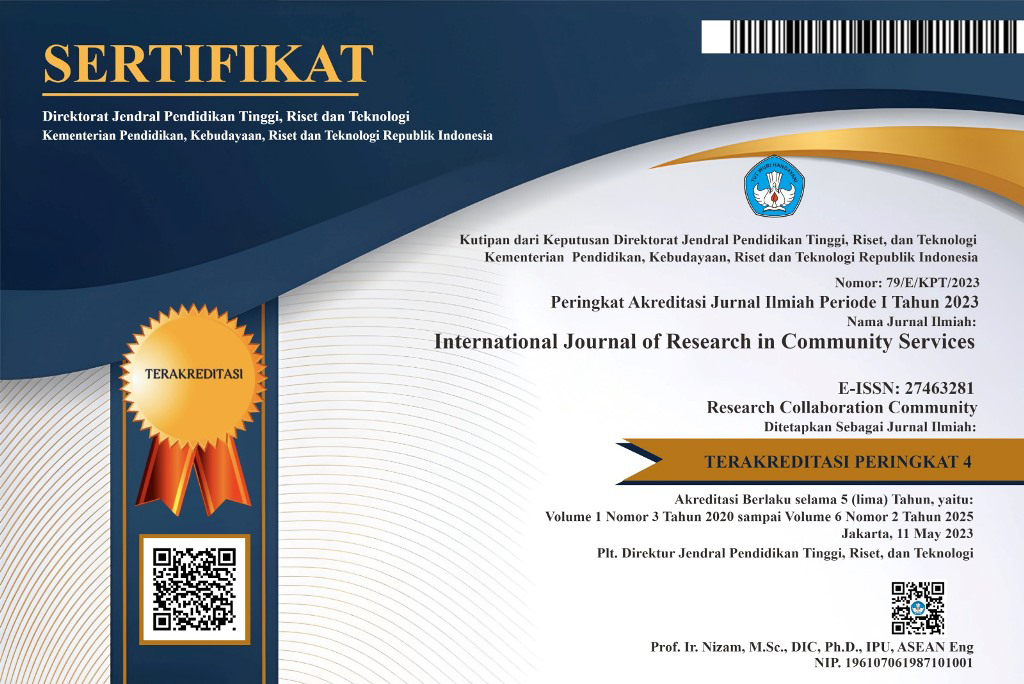Basic Programming Training in Python for Junior High School Students at Al Fitrah Islamic Boarding School
Abstract
This research discusses the implementation of basic programming training using the Python programming language for junior high school (SMP) students at Al Fitrah Islamic Boarding School. The aim of this study is to provide an overview of the training experience and its impact on students' understanding of programming and their proficiency in using Python. The research method used is qualitative with a case study approach. The participants of the study consist of students from the seventh and eighth grades at Al Fitrah Islamic Boarding School. Data was collected through observations, interviews, and tests of students' learning outcomes. The results of the research show that the basic programming training with Python effectively improves students' understanding of programming concepts and develops their computational skills. Additionally, the students demonstrate high interest and enthusiasm in programming activities, indicating strong potential for developing technological skills in the future. This research concludes that basic programming training with Python can be well integrated into the junior high school curriculum to enhance digital literacy and prepare students to face the challenges of an increasingly advanced technological world.
Keywords
Full Text:
PDFReferences
Almulla, M. A. (2020). The Effectiveness of the Project-Based Learning (PBL) Approach as a Way to Engage Students in Learning. SAGE Open, 10(3). https://doi.org/10.1177/2158244020938702
Assyne, N., Ghanbari, H., & Pulkkinen, M. (2022). The essential competencies of software professionals: A unified competence framework. Information and Software Technology, 151(July), 107020. https://doi.org/10.1016/j.infsof.2022.107020
George, M. L. (2020). Effective Teaching and Examination Strategies for Undergraduate Learning During COVID-19 School Restrictions. Journal of Educational Technology Systems, 49(1), 23–48. https://doi.org/10.1177/0047239520934017
Haleem, A., Javaid, M., Qadri, M. A., & Suman, R. (2022). Understanding the role of digital technologies in education: A review. Sustainable Operations and Computers, 3(May), 275–285. https://doi.org/10.1016/j.susoc.2022.05.004
Pu, D., Ruswandi, U., & Arifin, B. S. (2022). Integration of Islamic Values on Social Studies Education at Madrasah Tsanawiyah Al Musaddadiyah Garut. International Journal Pedagogy of Social Studies, 7(1), 15–24.
Simões, S., Oliveira, T., & Nunes, C. (2022). Influence of computers in students’ academic achievement. Heliyon, 8(3). https://doi.org/10.1016/j.heliyon.2022.e09004
Verhoeven, M., Poorthuis, A. M. G., & Volman, M. (2019). The Role of School in Adolescents’ Identity Development. A Literature Review. Educational Psychology Review, 31(1), 35–63. https://doi.org/10.1007/s10648-018-9457-3
Yuliana, Y. G. S. (2022). Internet-Based Learning Media in the Digital Era of Efl Learning in English Education Master Program (S2 Be)”. Journal of English Educational Study (JEES), 5(1), 57–66. https://doi.org/10.31932/jees.v5i1.1491
DOI: https://doi.org/10.46336/ijrcs.v4i4.489
Refbacks
- There are currently no refbacks.
Copyright (c) 2023 International Journal of Research in Community Services

This work is licensed under a Creative Commons Attribution 4.0 International License.
Published By:
IJRCS: Jalan Riung Ampuh No. 3, Riung Bandung, Kota Bandung 40295, Jawa Barat, Indonesia
Indexed By:

This work is licensed under a Creative Commons Attribution 4.0 International License.
View My Stats








